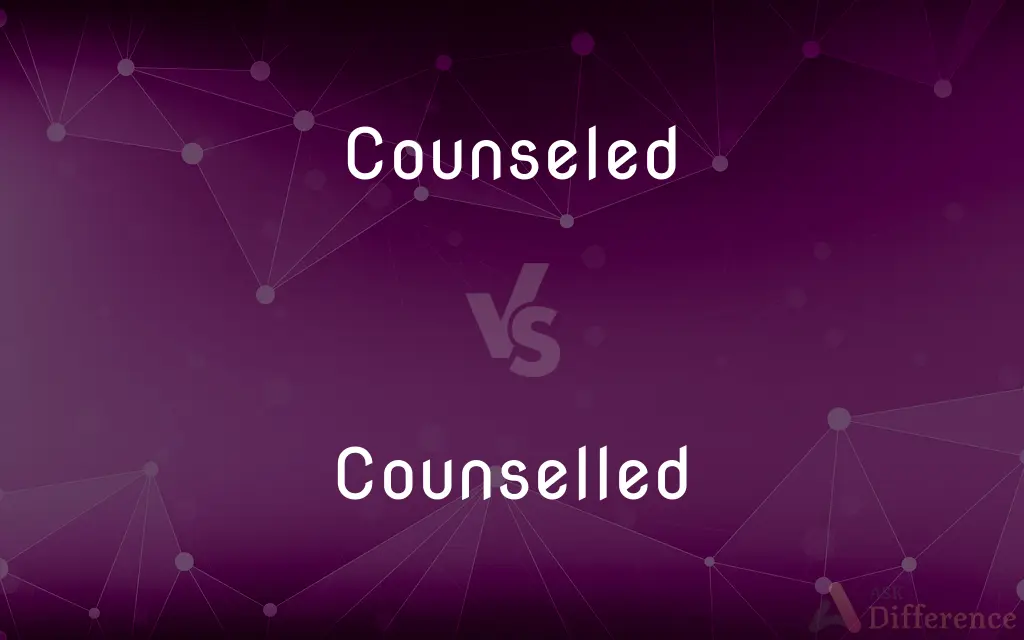Counseled vs. Counselled — What's the Difference?
By Maham Liaqat & Fiza Rafique — Updated on April 4, 2024
"Counseled" is the American English spelling for providing advice or guidance, whereas "counselled" is the British English variant of the same term.

Difference Between Counseled and Counselled
Table of Contents
ADVERTISEMENT
Key Differences
The primary difference between "counseled" and "counselled" lies in their spelling, which reflects the distinction between American and British English conventions. In American English, verbs that end in a vowel plus "l" typically have a single "l" when adding endings like "-ed" or "-ing," hence "counseled." Conversely, in British English, the final "l" is doubled when adding these endings, resulting in "counselled." This distinction, while subtle, is a key aspect of the variations found in English spelling across different regions.
When it comes to usage in a sentence, there is no difference in meaning between "counseled" and "counselled." Both spellings indicate the act of giving advice or guidance, often in a professional context. For example, a therapist might be described as having counseled/counselled a client on coping strategies for stress. This highlights that the choice between "counseled" and "counselled" should be based on the intended audience's dialect.
The context in which these terms are used also does not differ; both refer to the process of providing advice or therapeutic support. Whether in legal, educational, or psychological settings, the action described by "counseled" and "counselled" is the same, emphasizing the importance of understanding and adapting to linguistic preferences based on regional English variations.
In professional writing and formal communications, the choice between "counseled" and "counselled" can reflect an adherence to either American or British English standards. Organizations and individuals often choose their spelling based on the primary audience's location or the standard language use within their industry or sector, ensuring clarity and consistency in communication.
Understanding these spelling conventions is crucial for learners of English as a second language, editors, and writers, who must navigate these variations to communicate effectively across different English-speaking countries. This knowledge aids in producing text that is stylistically and regionally appropriate, enhancing the writer's credibility and the text's accessibility to its intended audience.
ADVERTISEMENT
Comparison Chart
Spelling Convention
Single "l" before "-ed"
Double "l" before "-ed"
Meaning
Providing advice or guidance
Providing advice or guidance
Usage Context
Used in American English
Used in British English
Application
Legal, educational, psychological advice
Legal, educational, psychological advice
Audience
Intended for American English speakers
Intended for British English speakers
Compare with Definitions
Counseled
Given professional psychological support.
He was counseled after the traumatic event.
Counselled
Provided advice or guidance.
The solicitor counselled his client on legal strategies.
Counseled
Recommended a course of action.
She counseled patience during the negotiation.
Counselled
Advised formally in an educational setting.
Pupils were counselled on university choices.
Counseled
Consulted for expert opinion.
The committee counseled with environmental experts.
Counselled
Recommended a course of action.
He counselled waiting until the market stabilizes.
Counseled
Provided advice or guidance.
The lawyer counseled her client on legal options.
Counselled
Consulted for expert opinion.
The council counselled with urban planners.
Counseled
Advised formally in an educational setting.
Students were counseled on career paths.
Counselled
Given professional psychological support.
She was counselled following the incident.
Counseled
The act of exchanging opinions and ideas; consultation
Joined in counsel with colleagues before deciding the issue.
Counselled
The act of exchanging opinions and ideas; consultation
Joined in counsel with colleagues before deciding the issue.
Counseled
Advice or guidance, especially as solicited from a knowledgeable person.
Counselled
Advice or guidance, especially as solicited from a knowledgeable person.
Counseled
Private, guarded thoughts or opinions
Keep one's own counsel.
Counselled
Private, guarded thoughts or opinions
Keep one's own counsel.
Counseled
A lawyer or group of lawyers giving legal advice and especially conducting a case in court.
Counselled
A lawyer or group of lawyers giving legal advice and especially conducting a case in court.
Counseled
To give counsel to; advise
Counseled us to be prudent.
Counselled
To give counsel to; advise
Counseled us to be prudent.
Counseled
To recommend
Counseled care in the forthcoming negotiations.
Counselled
To recommend
Counseled care in the forthcoming negotiations.
Counseled
To give or take advice. See Usage Note at council.
Counselled
To give or take advice. See Usage Note at council.
Counseled
Simple past tense and past participle of counsel
Counselled
Simple past tense and past participle of counsel
Common Curiosities
Is there a difference in meaning between "counseled" and "counselled"?
No, both spellings denote providing advice or guidance.
Are there other words with similar American and British spelling differences?
Yes, many words have similar variations, such as "traveled/travelled" and "modeled/modelled."
How do American and British English spelling conventions differ?
American English often simplifies spellings by eliminating extra vowels or consonants, whereas British English retains them.
Why do "counseled" and "counselled" have different spellings?
The difference in spelling is due to variations in American and British English spelling rules.
How do I know whether to use "counseled" or "counselled"?
Choose based on the regional spelling conventions of your audience (American English vs. British English).
Is one spelling more correct than the other?
No, both spellings are correct within their respective dialects.
Can "counseled" and "counselled" be used interchangeably?
Yes, but the choice should align with the intended audience's dialect (American vs. British English).
What is the difference between "counseled" and "counselled"?
The difference is in spelling, reflecting American and British English conventions, respectively.
In what contexts can "counseled" and "counselled" be used?
Both can be used in legal, educational, or psychological contexts to describe the act of giving advice.
Can using the wrong spelling affect my writing's reception?
Yes, using the wrong regional spelling can impact the perceived professionalism and regional appropriateness of your writing.
Share Your Discovery

Previous Comparison
Gravity vs. Gravitation
Next Comparison
Haber vs. TenerAuthor Spotlight
Written by
Maham LiaqatCo-written by
Fiza RafiqueFiza Rafique is a skilled content writer at AskDifference.com, where she meticulously refines and enhances written pieces. Drawing from her vast editorial expertise, Fiza ensures clarity, accuracy, and precision in every article. Passionate about language, she continually seeks to elevate the quality of content for readers worldwide.















































